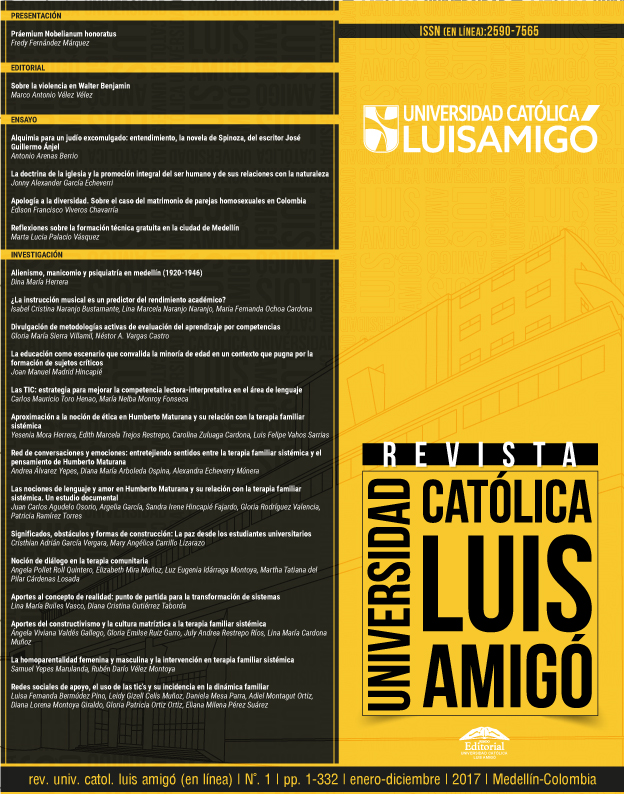Disclosure of active methodologies of evaluation of competency-based learning
DOI:
https://doi.org/10.21501/25907565.2651Keywords:
Assessment, active methodologies, skills, learningAbstract
In order to improve the quality of learning processes of teachers in higher education, we have reviewed existing research on best practices that result from solid conceptual contributions to ensure the best results in achieving effective learning for professional life. As a result, this article proposes that higher education teachers must obtain the necessary expertise in the performance of a four-stage learning process combined with deep knowledge of the principles and practices of their particular discipline, to guarantee success in facilitating student’s learning. The four stages of this process are: a) determining the student´s expected professional results, b) adequate translation skills that allow you to generate these results, c) the proper selection and application of active methodologies facilitating the development of these skills and d) the effective use of assessment methodologies of learning process based in competencies, all of them consistent with those used for the generation and facilitation practice. Since fourth stage of the process becomes the most important in the verification of the other three, it is necessary that educative institutions provide a complete instruction that encourages understanding of its importance and how to incorporate it as a practice of working life teacher. Therefore, this article puts in consideration of academics, structure and development of the contents of a training course on active learning methodologies based in competency evaluation.
Downloads
References
Briedis, D. (2002). Developing Effective Assessment of Student Professional Outcomes. Revista Int. J. Engng., 18(2), 208-216. Recuperado de: http://www.ijee.ie/articles/Vol18-2/IJEE1273.pdf.
Coll, C. y Sánchez, E. (2008). Presentación. El análisis de la interacción alumno-profesor: líneas de investigación. Revista de Educación, (346), 15-32. Recuperado de: http://www.revistaeducacion.mec.es/re346/re346_01.pdf
Delors, J. (1999). La educación encierra un tesoro. España: Santillana.
Díaz Barriga, F. y Hernández Rojas, G. (1998). Estrategias docentes para un aprendizaje significativo (pp. 69-112). Una Interpretación constructivista. México: McGrawHill.
EFA forum Secretariat. UNESCO EDUCATION FOR ALL. Achieving the goal. working document of we international Coaru ranv. Editorial team: Dieter Berstecher Cynthia Guttman Michael Lakin Britt SjGstedt Statistics: Q.U. Khan Graphic design: Sylvaine Baeyens fonm.19 June 1996.
Fernández M., A. (2006). Metodologías activas para la formación de Competencias. Educatio siglo XXI, (24), 35–56. Recuperado de: http://revistas.um.es/index.php/educatio/article/viewFile/152/135 .
Gonczi, A. y Athanasou, J. (1996). Instrumentación de la educación basada en competencias. Perspectiva de la teoría y la práctica en Australia. México: Limusa.
Monereo, C. (2009). La autenticidad de la evaluación. En M. Castelló (coord.) La evaluación auténtica en Enseñanza Secundaria y universitaria: investigación e innovación. Barcelona: Editorial Edebé.
Obaya, A. y Ponce, R. (2010). Evaluación del aprendizaje basado en el desarrollo de competencias. Recuperado de: http://www.izt.uam.mx/newpage/contactos/anterior/n76ne/competencias.pdf.
Rust, C. (2002). Purposes and principles of assessment. Oxford: Oxford centre for staff and learning development. Recuperado de: en:http://www.brookes.ac.uk/services/ocsld/resources/briefing_papers/p_p_assessment.pdf
Torres, M. (1999). Nuevo rol docente: ¿Qué modelo de formación, para qué modelo educativo? En Torres (coord.) Aprender para el futuro: Nuevo marco de la tarea docente, 1999 (Documento preparado para la XIII Semana Monográfica organizada por la Fundación Santillana, Madrid, 23-27 Noviembre de 1998). Recuperado de: http://www.ses.unam.mx/curso2011/pdf/M5_Lecturas/M5_S2_Torres.pdf
Villardón, G. L. (2006). Evaluación del aprendizaje para promover el desarrollo de competencias. Educatio siglo XXI, (24), 57-76. Recuperado de: http://revistas.um.es/index.php/educatio/article/viewFile/153/136
Downloads
Published
How to Cite
Issue
Section
License
PROPIEDAD INTELECTUAL
Los autores son moral y legalmente responsables del contenido de sus artículos, así como del respeto a los derechos de autor. Por lo tanto, éstos no comprometen en ningún sentido a la Universidad Católica Luis Amigó.
La reproducción de los artículos se regirá conforme a lo descrito en http://creativecommons.org/licenses/by-nc-sa/4.0/

